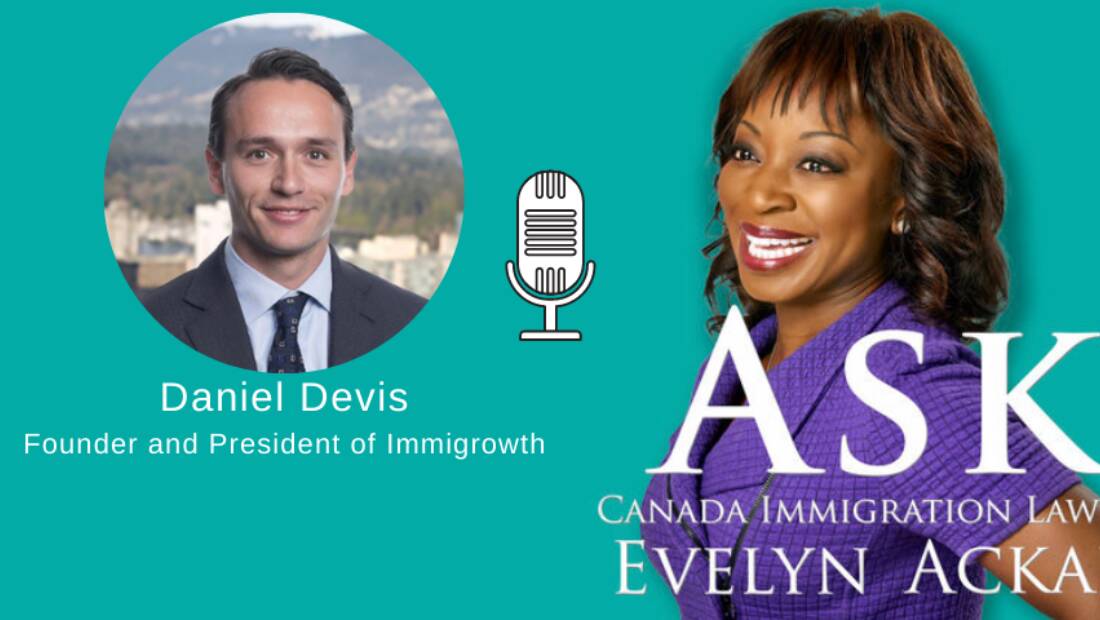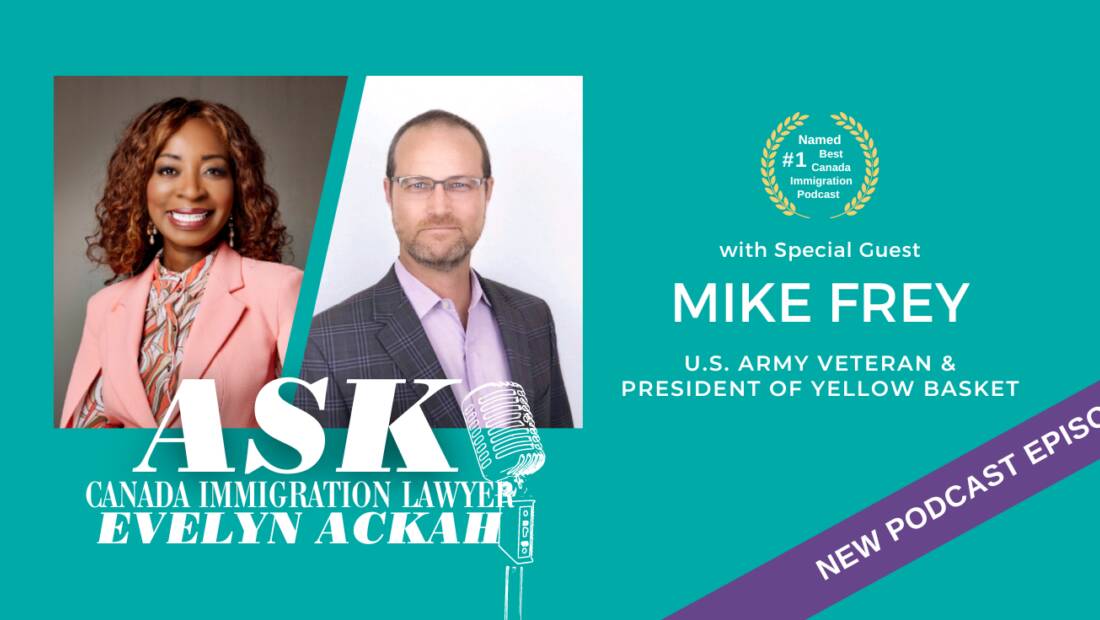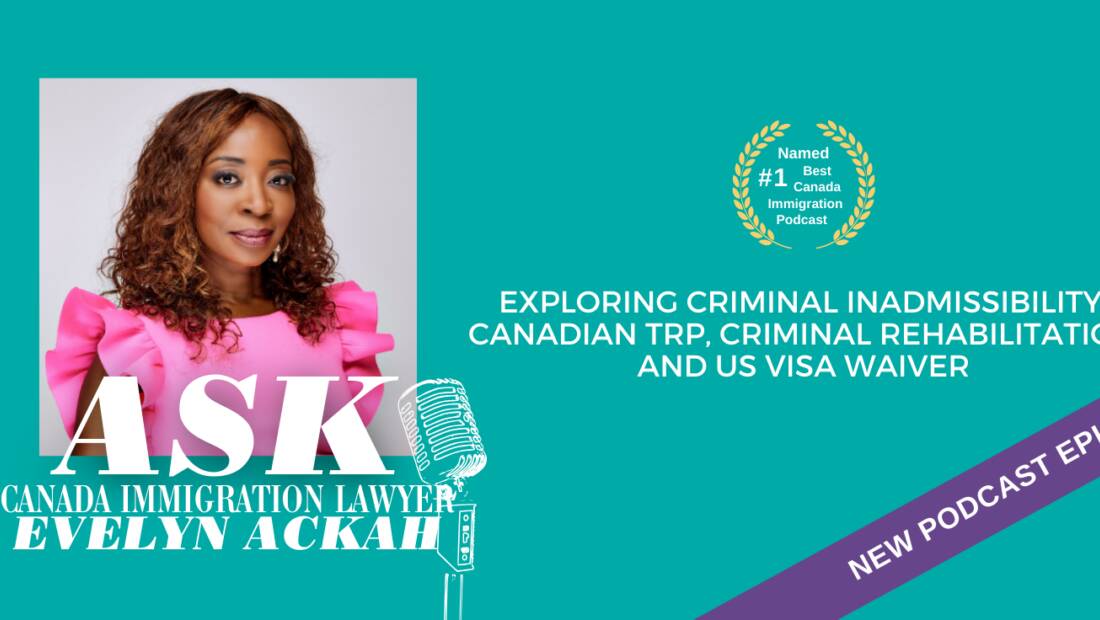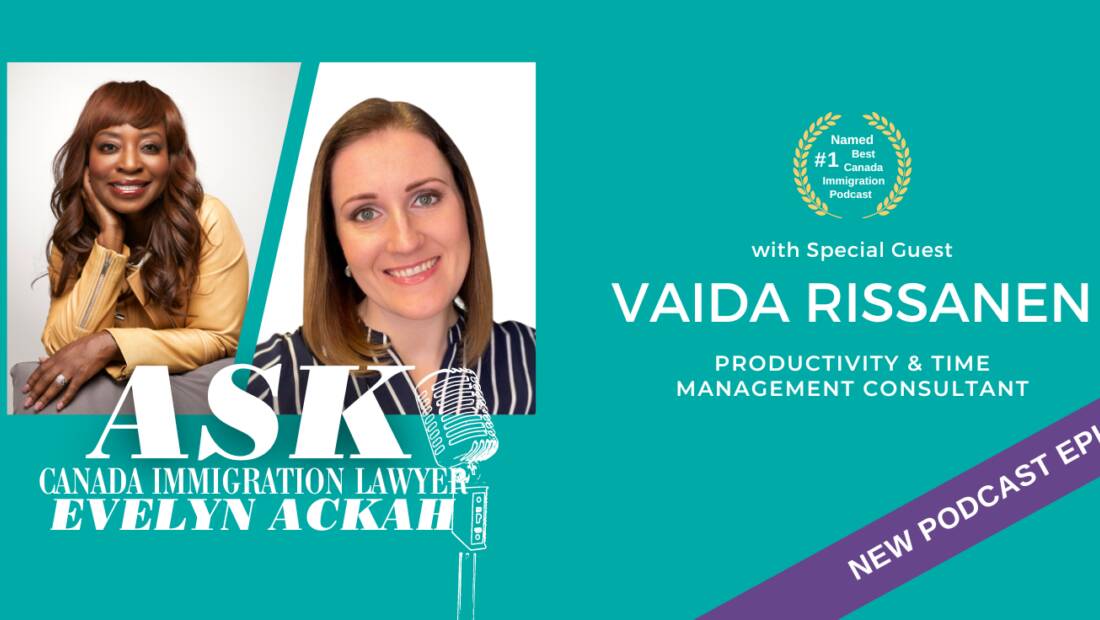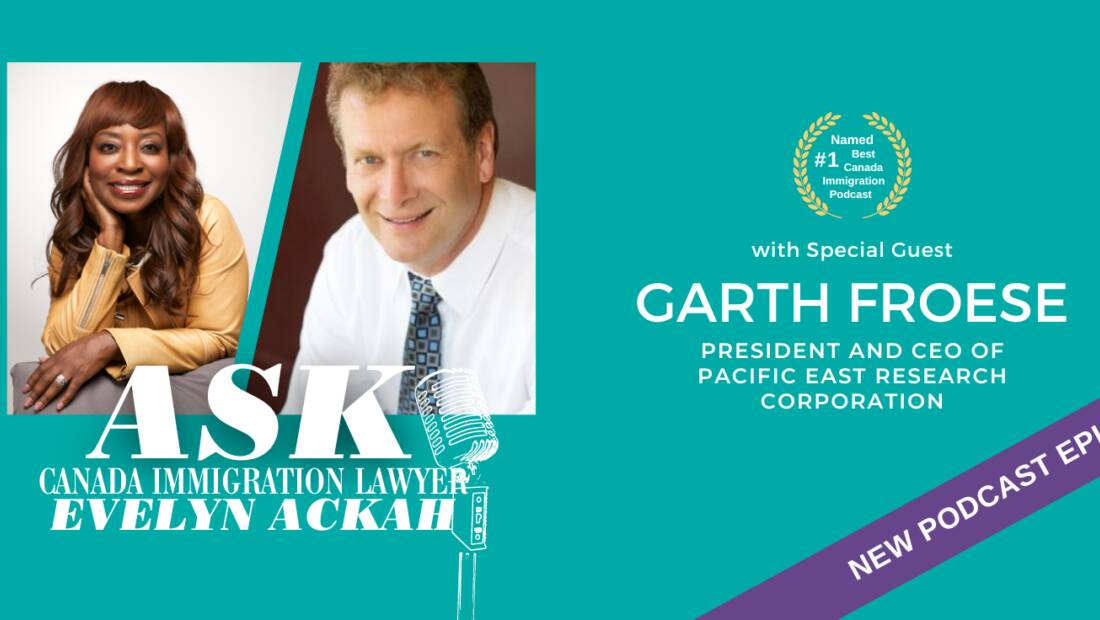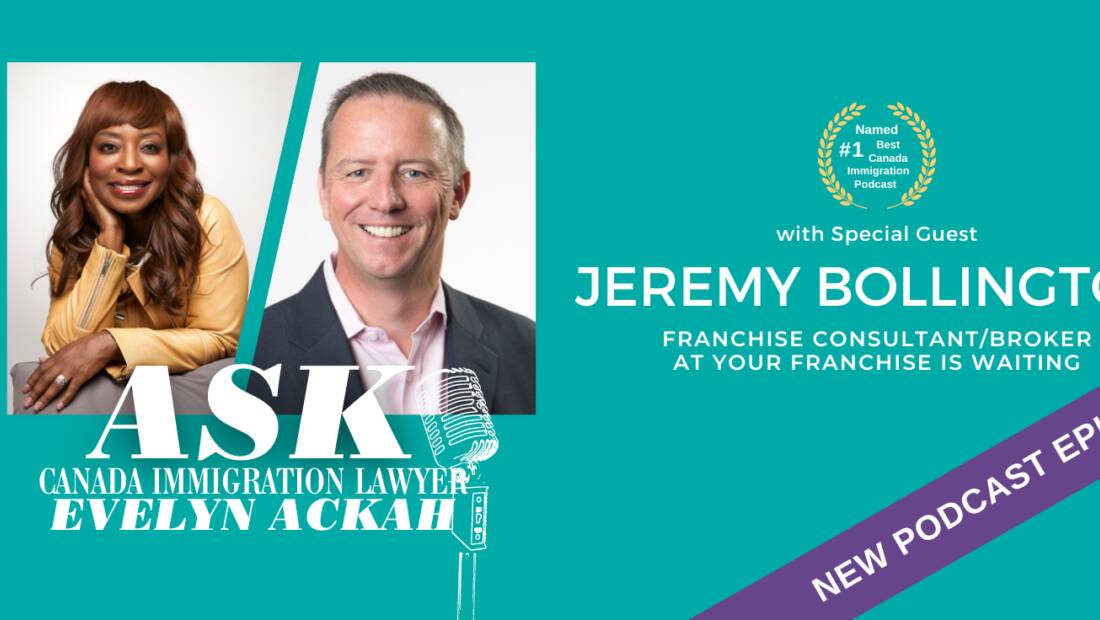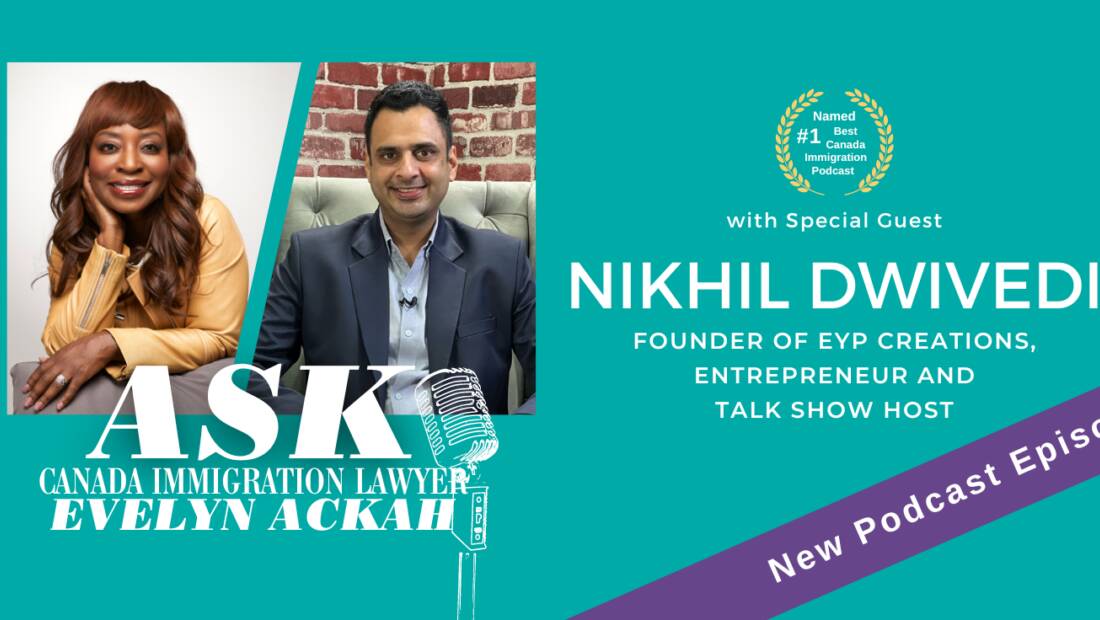Or listen on your favourite podcast app
BOOK YOUR FREE CASE EVALUATION
Immigration lawyer Evelyn Ackah talks to Daniel Devis, the Founder and President of Immigrowth. Immigrowth is a management consultancy that provides business plans for immigration Individuals moving to Canada who want to qualify under the entrepreneur or investor categories, and even under intercompany transfers. Daniel Devis and Immigrowth help immigrants create the documentation to demonstrate they meet the immigration requirements, and how they will implement their business plan once they arrive in Canada. Immigrowth is not immigration lawyers or consultants but works closely with their clients' immigration lawyers to prepare their entrepreneur business plan.
Daniel talked about why he started Immigrowth, and how a business plan helps immigrants succeed on their entrepreneurial journey to Canada:
- How does a business plan help applicants succeed in their immigration applications?
- Is prior business experience required for a foreigner to start a business in Canada?
- The 3 ways immigrants can start a business in Canada
- What are alternatives to the owner-operator LMIA visa?
- The steps in the 10-15 days required to create the initial business plan
- Types of new businesses being created by immigrants to Canada
- Countries of origin for Canadian entrepreneur immigrants
- How Immigrowth provides personal service to its clients
- How Immigrowth sets their clients up for success after they land in Canada
- Startup visa application support
- 3 core pillars of a successful immigration business plan
About Evelyn Ackah
Evelyn Ackah is the Founder and Managing Lawyer at Ackah Business Immigration Law. We work with individuals and business owners from all over the world. For more information to immigration to Canada or the United States, Ask Evelyn Ackah at Ackah Business Immigration today at (403) 452‑9515 or email us directly at contact@ackahlaw.com.

Transcript
Evelyn Ackah:
Good day. This is Evelyn Ackah from the Ask Evelyn Ackah Immigration Lawyer podcast. And I have the pleasure today of having Daniel Devis, who is the founder and president of Immigrowth to join us today on our podcast. Welcome, Daniel.
Daniel Devis:
Hi, Evelyn, pleasure chatting with you. Really excited to talk to you today.
Evelyn Ackah:
Thank you so much.
Daniel Devis:
Yeah. Definitely.
Evelyn Ackah:
Thank you so much for joining. I know that you started Immigrowth in 2019. So tell us what is Immigrowth for those who don't work with you as closely as we do here at Ackah Law?
Daniel Devis:
Sure. Most definitely. So at Immigrowth, we are a management consultancy. We aim to provide business plans really for immigration purposes. So that's both for federal as well as for provincial nominee programs to set them up for success in their immigration pathway, but also to set the applicant up for success upon landing in Canada.
Evelyn Ackah:
That is so great. It's a great market because we, as lawyers generally, we don't do that and we don't have those skills. And so we always end up referring out, especially for clients coming in under entrepreneur or investor categories, but more and more, even under the intercompany transfers, some of them want help building the business plan that they will then actually implement when they arrive in Canada. What led you to this area?
Daniel Devis:
Long story short, it's always an organic story. A long story short, my experience for work for incubator, venture capital firm, also build financial models for Fortune 500 companies, so I was always intrigued about anything that involves what makes a business tick. And obviously being an immigrant myself into Canada sparked that idea too. But to kind of further give you more idea as to how it really travelled, I was working as a financial consultant for a Canadian publicly listed company and I was there for an engagement and a fellow employee's uncle was planning to apply for the OMP Pathway, which is the Ontario entrepreneur pathway. And they consult with people within the field to prepare them for the business concept, which is the first stage of the process. And the results weren't what they expected.
Daniel Devis:
So the person came to me and say, "Hey, this is, this is the situation my family members in. Do you mind having a look?" And there it really was interesting because I spoke to that person and it was just really to understand what he was looking for. What are they looking to do? And how do we communicate this clearly into that, in this case, the business concept that is not only meet all the key requirements but also really articulates everything clearly what this person is planning to do within Ontario?
Daniel Devis:
So that was for me really the eye-opening factor to really understand how the business plan space is. It's a crowded space. However, it's a matter of how can we really understand the vision of the applicants and how could we align that with key aspects, from an immigration perspective, which made me want to pursue and help people like myself as well, being an immigrant really sparked that. Yeah.
Evelyn Ackah:
So where are you from originally Daniel?
Daniel Devis:
So I'm born and raised in Belgium. So in the Flemish region of Belgium, the north. And I've lived here now in Canada for over for almost three years now.
Evelyn Ackah:
That's great.
Daniel Devis:
And I've also lived in-
Evelyn Ackah:
Did you do your own immigration?
Daniel Devis:
I did.
Evelyn Ackah:
Of course.
Daniel Devis:
I did my own immigration. No, no. It's been an extremely fun journey being here, obviously as a Canadian immigrant, but just to help fellow immigrants, because I can definitely understand how sometimes a bureaucratic process takes time and it's sometimes hard to navigate that world. Just helping people with my skillset was really the key to keep going.
Evelyn Ackah:
I love it. I think both of us, I mean, people love to work in areas where they're helping people. Right? At the end of the day, yes, we want to run businesses, but we also, underlying is this core value of, we want to help them be successful. You understand the immigration experience. I understand the immigration experience. How do you think a business plan helps them succeed on the immigration side? What value does that bring?
Daniel Devis:
Well, I think there's a lot of key reasons. First off. I always try to look at it from a government official point of view. So Canada just wants to really understand what the applicant intends to do. And I think a key way with a business plan, is just really, it covers all the full outline of what the applicant intends to do, what the vision is of the applicant, how they intend to act upon that plan. So the business plan it's really an action plan for the government to assess a case, this person, has he done the right due diligence? Is this a person that is indeed an expert in the fields within their home country potentially? And do they want to further continue that in Canada? And that's the main key goal again for business plants and what we aim to distinguish ourselves is.
Daniel Devis:
And we aim to be, to give you the analogy of a boxer, for example. We want to be the sparing partner with people in the room. So we really see the business plan to be a continuous mutual collective process where we can go back and forth. Because obviously people that have experienced within doing a business within their home country, they understand the ins and outs and it's for us to really understand what they intend to do. We can relay what the aspects are from the Canadian market's points of view. And then we really have this collective process, how we can figure out to the really key core of a business plan that also helps the applicants because again, we want to help them from an immigration point of view, but we want to help them also once upon landing in Canada. And that's really the key goal.
Evelyn Ackah:
So for instance, we get a lot of people who think they want to set up a business, but they don't run a business back home. Those aren't really ideal for you, is that right? Do you need to have the business experience to be successful in getting a business plan to then come to Canada? What are your thoughts on that?
Daniel Devis:
Not necessarily. So obviously the short answer to that question is it depends. It depends on certain pathways. Some programs really want to see how you can leverage your past experience the best in Canada, but that could be in a lot of different ways. So if you are a business owner in your home country, that could be a potential route. But it doesn't always have to be that case. There's people that can leverage skills, being part of multi-conglomerates, large companies, and having made a tangible impact there equally sets them up for success. When it comes to, and again, I can talk about this for hours, but when it comes to some people come to us and they say, "Hey, could you tell me the right business? Could you tell me a business that works for me?" It really comes down to, again, there's no one key success, we're want to telling people which business to pursue.
Daniel Devis:
But I think in my opinion, it comes down to really three key things. The first key thing, what is your passion? When you arrive in Canada, what would you want to make up, go up out of bed and pursue your business? The second from my plan is the experience. So if you had experience within the field, what are your skillset and what makes you unique as an applicant? And every person has an incredible background, in some way. Okay. It doesn't always have to be an extremely large or extremely significant way from a financial point of view, impact or revenue that they have generated. It could be in a lot of social ways, in a lot of cultural ways. And that is I think the second point. And then obviously the third point comes down to resources. So resources, your intent from a financial point of view, but resources in terms of intellectual know-how, again, key things, licensing that could make you stand out or set you up for success by entering the market in Canada.
Evelyn Ackah:
That is fabulous, Daniel. Do you help people find a business to invest in? Is that a part of Immigrowth's area as well, or do they have to come to you with a plan and a business already ready to buy?
Daniel Devis:
Sure. So I think there are three ways how people can really start a business here They just start from scratch. So when it comes to starting from scratch, we definitely, again, we can try to see people's backgrounds, really understand who they are and what they aspire to do. We definitely share some insights from a macroeconomic point of view. What are key indicators that sort of industries have been growing? That is something that we help our applicants with. The second route that people do as well is acquired businesses. In that sense, when it comes to acquisition of businesses, we do have some brokers, business brokers who could help them, identifying the appropriate business. But it's not something we currently do ourselves. And then the third route is franchises. So also there they intend to start a prior franchise. We can put them in touch with certain franchises within the field or help them out to navigate that journey.
Evelyn Ackah:
That's so great because you offer a very supportive area of expertise that's separate and different from what we offer. And that's why whenever people call, I'm like "You've got to call Daniel Devis. Please talk to Daniel Devis." And you can help people from all across the country, not just in Vancouver. You can do immigration business plans all across the country, just like we do immigration federally. Is that right?
Daniel Devis:
That's absolutely correct. So yes, we don't necessarily focus on one area in particular. So we do, again, on a federal level, on a provincial level. A lot of work we do is also for our east coast as well as west coast. So there's no-
Evelyn Ackah:
How do you stay updated though, Daniel, like you almost need to become an immigration lawyer or an immigration consultant. How do you stay up on all the changes to the laws, to the regulations?
Daniel Devis:
Oh yeah, obviously it's a key thing to stay updated, also from our perspective, the one key route is obviously follow the guideline. Once the guideline changes, that's something we definitely are actively acting upon. The second key thing is talk to you. To people who are IRCC registered, who really understand things. And also obviously our key goal is we have a lot of people we talk with from an immigration perspective. So it's all a matter of how do we interpret the regulation and attend the regulation. Now, can we clearly navigate in setting up the applicant up for success? We do that. And then lastly, we stay up to date with news, so CIC news and RCA and other-
Evelyn Ackah:
Just like lawyers do. It's a lot of daily changes and information. And it's hard sometimes to keep up, like recently, as you know, the owner-operator changed the owner-operator LMIA process. And we had the good fortune that Ackah Law is working with Daniel and his team at Immigrowth on bringing a lovely family from Switzerland who is now here in Canada. And it was a wonderful experience and they got in and then the law changed and we were so happy. They got in under the owner-operators. She's already engaged us to start the permanent residence right away, as soon as they're eligible. But it just shows you that it's constantly changing. So when you work with other people, we'd love to have the success of that file. When one door closes, are you noticing your owner-operators are not as busy because they can't get those 200 points? Are they looking at other options?
Daniel Devis:
Oh most definitely. So I think effectively, on April 1st, Evelyn, we saw that change or right off the bat, but it was something that people start to anticipate and plan for. I think a lot of people have, both applicants, as well as immigration lawyers. There's definitely a shift in focus to our federal applicants. Then they go look at others. It doesn't mean, and again, it hasn't been discontinued. It's still an open pathway and it's still able to apply. However, it made everything significantly more strict for the applicants. So there are other pathways for obtaining work visas for temporary reasons, work reasons such as the international mobility programs or people tend to really shift more on a provincial focus and really start that applying for those as well.
Evelyn Ackah:
That's so great. So when you get a new client or a referral, what's your process? Explain to me, because I think something I read was like, you can do a business plan in 15 days or something. I'm like, "Oh my goodness." Depending on the business, but tell me about the process from beginning to end. How does that look like?
Daniel Devis:
Sure. So assuming we would have our initial call here with me. So we do an initial call with applicants or with lawyers. Again, we work with both. So we do a call with the applicant, we want to understand who you are, do you know, firstly things, eligibility, have you identified the right pathway? So again, we clearly distinguish ourselves and not giving any immigration or any eligibility advice. So we refer them either to immigration lawyers, like yourself that can help out the applicants. So first thing, identify the right pathway. From that point in time, we can have additional discussions about the business. What is it you anticipate to do? Which location do you aim to focus on? From that point in time, you would say, "Yes. Okay. I know my eligibility. I have an initial idea about what type of business I'm looking to pursue."
Daniel Devis:
We would obviously go and commence the business plan, contractual agreements, get all the information, that information we gather either via call, like we do right now, or we send out a questionnaire where people can further articulate what the vision is of their business and what they want us to take into consideration. And that is really the point in time where it takes us two to three weeks or 10 to 15 business days to provide an initial draft. So that's when the point in time we deliver the draft, but often it can be quite fast. It can be really fast dependent on aligning with the applicant.
Evelyn Ackah:
Wow. And are there types of businesses you're seeing more than others Daniel in the last year? Let's say, what are the kind of more... I mean, obviously, our horseshoe businesses, was not a typical, that was really unique for us, I think. But what do you think is the most typical type of files that you see? The type of businesses?
Daniel Devis:
You'd be surprised by the types of businesses. It's a wide range of businesses.
Evelyn Ackah:
Oh, really?
Daniel Devis:
It's significantly different. It can vary from really tech-related, app development up to drone building businesses even. But I think those are more special business, those are not that common. I think more common businesses is how people can leverage, again, their skillsets. So for example, we had a person that had doctor backgrounds within their home country and specifically in a certain niche. Now the key thing it's extremely regulated space in Canada. So how do you leverage that skillset? Then we thought about how can you provide more consulting advice to other clinics in terms of getting know-how or just source the right machinery in this case.
Daniel Devis:
So we see a lot of those businesses. Or, we see a lot of businesses such as obviously tangible related businesses, a lot of wholesale, a lot of trade cause obviously Canada wants to support a trade surplus, so that means imports through a value-added process to their manufacturing and then start exporting their goods or services. So that is definitely a big, big, big chunk of the business plans we do. And then it comes down to more localized businesses. Meaning local businesses, such as coffee shops, restaurants, and businesses like those. Yeah.
Evelyn Ackah:
Wow. And then I know in British Columbia years ago, I'm from Vancouver as you know, and there were a lot more entrepreneurial streams to get into BC. Right? And I grew up and I would see all these people coming in, buying a business, getting your PR. Things have changed and gotten more narrow. So I'm always interested by that in terms of how it's changing, who's coming to Canada. Are you seeing people coming from different countries maybe? Before there used to be maybe a larger Asian population in coming into the BC area because of some of the programs we had, where are they coming from now?
Daniel Devis:
Oh, they still come from all over the world, from various continents, including Asia is definitely a large chunk, but it comes, like you've mentioned one from Switzerland, a lot of them from Europe are also looking at Latin America as well as Africa. Those are, I think the main continents. There's one key in particular, it's still, I think Southeast Asia, there's still a lot of immigrants or people that want to become investors or I think this whole COVID area that we currently experiencing, many people realize where do we see ourselves in the future and people that are really now saying, "Okay, now it's the perfect time to map out into starting the immigration process." So.

Evelyn Ackah:
Yeah. We're seeing that too. We're seeing that too. So tell me about your team. I mean, I know you started this in 2019. How have you grown and are you doing everything by yourself or do you have people behind the scenes that support you?
Daniel Devis:
Oh most definitely. I wouldn't be able to do it all by myself. I got a great team behind me of five. We call ourselves the finance geeks with personality, it means we love to deep dive into the figures and really understand everything from obviously a financial point of view, but also articulating it clearly into a thorough business plan that covers all these key areas. So we're a bunch of CPA's, CFA's, MBAs, all like having fun working on those business plans.
Evelyn Ackah:
Oh my God. That sounds so exciting. I mean, what I really like about Immigrowth compared to some of the other firms that I've had dealings with before is it's not a factory. You don't feel like it's just... There are some that you just feel like they're just throwing stuff on the wall and it doesn't create that personal experience. And I think when you operate that way with your business plan, you don't have the detail. You don't have that accuracy. You don't have the specificity. And I think it affects the success of the work we do if the business plan isn't really fine-tuned.
Evelyn Ackah:
And so what I love about Immigrowth and so far the clients we've sent your way, they've been very happy because it's personal. They don't feel like they're just a number and that the material they get is a high, high quality done by, as you said, MBA's, CFA's, all those people that know the business world. And they know the Canadian market. Do you provide, Daniel, any other backend, support services, like for instance, when they get here, is there anything else that continues once they're successful?
Daniel Devis:
Sure, sure. So really the key vision as to kind of briefly pick up on what you just said, Evelyn, because I think it's definitely, really relevant to your question is what we aim to do we want to make sure that we, again, setting up the candidate out for success. What does that mean to me having done business plans, financial models? It is how do I... We want to make sure that the applicant really understands what planning for a business entails. Okay. So the key thing that we tend to do is really clear handover. So what are the key assumptions we used to calculate certain financial projections? Why did we assume a certain market entry strategy while you could do it 10,000 different ways? We really try to share reasoning. So we would make sure that there was an additional call that we could have either preparation for the interview or maybe the handover from the financial model, as well as the business plan to the applicants.
Daniel Devis:
So that's something we do continuously. But also as soon as you land, really try to understand, "Okay, super how do I further navigate, for example, certain things from a regulatory perspective, from financial planning? What are best practices in that sense? Because we know a plan, it's a matter of updating the plan and a plan can become obsolete. It 100% can. It's just a matter of how do you really understand and try to really help people take over the planning perspective to set them up for success once they land, but also after they land in Canada. That's what we really aim for.
Evelyn Ackah:
So Daniel, do you guys provide for the referrals, like for us, we always say find a good accountant even before they get here, obviously. Make sure they're incorporated properly set them up and the pieces we can do because we help with incorporation, but anything to do with tax planning that goes to a specialist. Do you have a referral network for them to say, "Okay, now you're here. You need to have a banker, you need to have this, you need to have this. And these are people that we like and trust that we might want to check out."
Daniel Devis:
At this point in time, no, we haven't. At this point in time, really when it comes to those things we really try to again, focus on a business plan. We want to really focus on what we do and what we do best. But we can definitely help them how to navigate those. That's what we currently do, what do you need to look out for in the space of immigration? Obviously, there's a lot of common pitfalls and things to verify, who you're dealing with. I think the same applies upon landing here in Canada and starting to wire over money and what are best practices related to that. We give them the information, but it's not something that we actively consult with or provide services.
Evelyn Ackah:
Yeah. Okay. That's how we practice too. Do you do any startup visa work as well?
Daniel Devis:
We have. We have done startup visa work and we currently still do, but they're quite uncommon visas. And again, it's a matter of obtaining that letter of support. I think a lot of people we get to want to pursue to startup visa, but I think we need to really understand what it means. I mean, I think we can definitely have this discussion if that's the route you'd like to go. It works but it's an extremely... It all comes down to getting the letter of support.
Daniel Devis:
So that means you need to get a foot in the door, you have a clear idea that's innovative and you know what you're setting yourself up for because there's different types of solutions out there that promise you to get there. So we're really, really, really picky in that, so to speak because the key goal, from our perspective, we want to make sure that we're transparent to the applicants. Okay. So the applicants can tie up a lot of financial investments in pursuing an immigration program, but we also want to align incentives. Do you really understand what you're setting yourself up for? Because not all of these programs, including the startup one in particular from my perspective it's a very niche type of a program that doesn't suit a lot of candidates.
Evelyn Ackah:
I agree completely. It's not easy at all. So give us a sense, Daniel, as we wrap up around, what are your price ranges just generally, broad range so that we know that it could be from this to this, depending on the complexity of course and the size and all the other variables.
Daniel Devis:
Yeah. So for price range, it's pretty straightforward. So we apply quite standard pricing for all of our provincials. So obviously it depends on an immigration requirements perspective, business perspective. I think an average does lie between 2000 to 2,500 Canadian dollars.
Evelyn Ackah:
Yep.
Daniel Devis:
So that includes the, I think, business plans really contained three core pillars. One of them, what makes you different as an applicant? What is your past background that we need to leverage into the business plan? The second is what's your market research and how does it translate to financial projections and why are they feasible, so what they call a viable business. And thirdly, how is this business going to generate economic benefits to the region? So those three key things are, I think, common really from a structure point of view that we and the prices-
Evelyn Ackah:
Very reasonable. Yeah. I always tell people, I'm like, "He's very reasonable." You need to increase your rates because when I've seen some of your plans, I'm always like, "Oh my God." There's so much that goes into it. I think people need to appreciate the value of what it helps to support because immigration is more. But I think at the same time, this is a key partner, a key element of a successful application. So I'm going to tell you now to increase your rates.
Daniel Devis:
I'll make a note of that Evelyn.
Evelyn Ackah:
Of course. Well thank you so much Daniel for your time and I'm so glad you could join us on the podcast for my law firm, because I wanted to make sure people understood that there are other experts that we work with as well on a regular basis that help them be successful with immigration. So you're it.
Daniel Devis:
The pleasure is all mine.
Evelyn Ackah:
And I really appreciate your time. And I'm looking forward to sharing this on social media and our podcasts so people know where to find Immigrowth. They are based in Vancouver, but they provide business planning services all across the country and also every province as well. And I'm assuming as well, you work with lawyers in every province as well based on the needs of your clients. So you're building great networks across the country and we look forward to continuing to work with you. Thank you so much.
Daniel Devis:
Likewise Evelyn. Pleasure working with you and thank you for this conversation and making the information accessible for everybody interested. Thanks so much.
Evelyn Ackah:
Thank you. Thanks so much.

